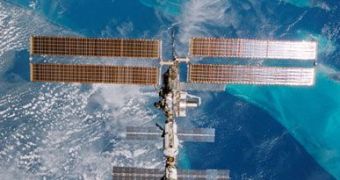Less than an hour ago, two Russian cosmonauts have begun the 26th spacewalk outside the International Space Station, for maintenance work and supporting external experiments.
The two cosmonauts are Fyodor Yurchikhin, who is a veteran with four previous spacewalks already, and Oleg Skripochka, making his first trip outside a spacecraft.
They started floating around the space laboratory a half an hour later than planned, at nearly 10:00 am EST – 15:00 GMT, beginning their six-hour spacewalk.
The space-walkers will install a multipurpose workstation on the starboard side of the Russian Zvezda service module, attached to the station, and also perform several other minor tasks, like cleaning the thermal insulation around the vents of an oxygen-generation system, and moving a television camera from one end of the Rassvet docking compartment to the other.
Before the end of their spacewalk, they must install a new materials experiment on a handrail on the station's Rassvet module, and also gather samples from the exterior of Zvezda and Pirs.
These samples will be analyzed later on, to see how the materials are affected by the space environment.
Another task that is attributed to them is cleaning and removing a robotics experiment called Kontur, from the port side of the Zvezda module into the Pirs airlock.
Kontur is a Russian project that stands for Development of a System of Supervisory Control Over the Internet of the Robotic Manipulator in the Russian Segment of ISS.
Yurchikhin and Skripochka are two of the six crew members living onboard the ISS, as part of the Expedition 25 mission.
The commander of the mission is NASA astronaut Doug Wheelock, and Skripochka, Yurchikhin, cosmonaut Alexander Kaleri and NASA astronauts Shannon Walker and Scott Kelly are serving as flight engineers.
While the two Russians are outside the station, the remaining four crew members are inside the two Russian Soyuz spacecrafts currently docked at the station, prepared to evacuate in case of an emergency.
This measure is a safety precaution taken for every Russian spacewalk, SPACE.com reports.

 14 DAY TRIAL //
14 DAY TRIAL //